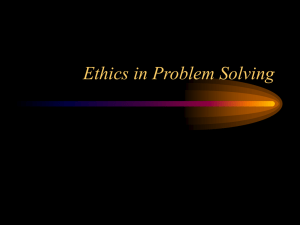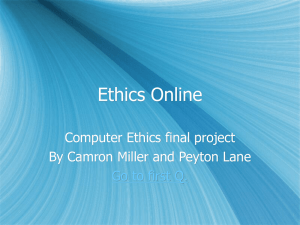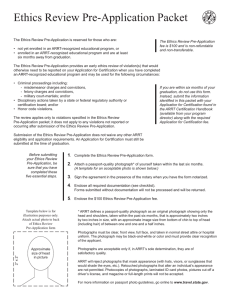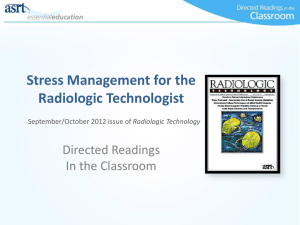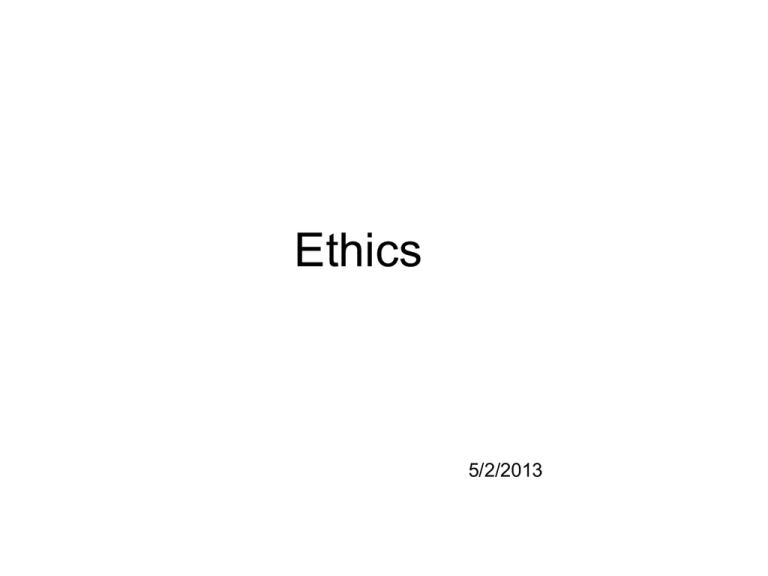
Ethics
5/2/2013
Difference between ethics and morals
Morals: personal beliefs
Ethics: standards or codes of behavior expected by the
group to which the individual belongs
Could be national ethics, social ethics, company
ethics, professional ethics, or even family ethics
Ethics vs Morals in the courtroom
Morals: criminal defense lawyer personally finds
murder immoral and reprehensible,
Ethics: must defend client even knowing defendent
is guilty and may murder again.
Legal ethics must override personal morals for
greater good of upholding a justice system in which
accused are given a fair trial and prosecution must
prove guilt beyond a reasonable doubt
Workplace
Ethics and morals can clash is at workplace where
Company ethics vs personal morality
Examples:
Performing unnecessary x-rays to make
money for hospital
Taking unnecessary x-rays to prove pt. is
unharmed by any action that takes place during
exam or hospital stay to protect against future
lawsuits even though there is no doubt pt. is fine
Conflict of Ethics and morals
The fact that abortion is legal - medically
ethical, while many people find it personally
immoral
Different ideas about what is moral:
Fundamentalists, extremists, and every day
person have very different viewpoints
ARRT Code of Ethics
Condensed and interpreted by T Hall
•
8/1/09
1.
• RT conducts self in professional manner
• Responds to pt. needs
• Supports associates and colleagues in
providing quality health care
2.
• RT acts to advance profession
• Provide services to humanity with full
respect for dignity of mankind
3.
• RT delivers pt care without bias to:
– Personal attributes
– Disease or illness
– Sex
– Race
– Creed or religion
– Economic status
4.
• RT uses knowledge
to operate equipment
only for the purposes
designed
• Applies procedures
and techniques
appropriately
5.
• RT assesses situation, uses care and
judgment and discretion
• Assumes responsibility for actions
• Acts in best interest of pt
6.
• RT observes and talks to pt to get
information for Dr. that will be helpful in
diagnosis and treatment
• Does not read x-rays or offer diagnosis
7.
• RT demonstrates expertise in control of
radiation to pt, self and others
8.
• RT practices ethical conduct appropriate
to profession
• Protects pt’s right to quality radiologic
technology care
9.
• RT respects confidences and privacy of pt
• Reveals confidential information only when
required by law or to protect the welfare of
individual or community
10.
• RT strives to improve knowledge and skills
through
– CE
– Professional activities
– Sharing knowledge
– Investigating new aspects of professional
practice
ARRT Rules of Ethics
As interpreted and condensed by T Hall
The Mandatory standards of acceptable
professional conduct for all RTs as set forth by
ARRT
Violation could cause temporary or
permanent loss of license!
1.
• Using fraud or deceit to procure, maintain
or renew state license
2.
• Cheating on ARRT exam
Copying or communicating with another
Having another person take the test
Stealing test from exam room
3. Not reporting• Conviction of a felony
or misdemeanor (no speeding or parking tickets need
be reported)
• Any alcohol or drug violations
– Criminal proceedings where you are found guilty
• Military court martials:
involving, sex, drugs or pt. related
infractions
4. Failure to report to
ARRT:
• Charges that may cost you your license in
x-ray or in any allied medical field in state
where you are working
• Or that you have been refused to be given
license by any state
5.
• Failure to perform radiologic technology
with reasonable safety or skill
6.
• Engaging in unprofessional conduct
• Failure to follow federal, state or local rules
regarding radiologic technology
• Any practice creating unnecessary danger to pt
life, health or safety
– Actual injury does not have to be established
7.
• Accepting or delegating any RT function
that might reasonably harm Pt.
– No one actually has to be harmed
8.
• Actual or potential inability to perform
duties with reasonable skill and safety to
pt. due to:
•
illness, drugs, alcohol or any mental or
physical condition
9.
Continuing to practice after you have been
declared:
Mentally ill, chemically dependent or a danger
to the public by the court
10.
• Any unethical behavior involving trying to
deceive, defraud or harm public
• Careless disregard for health, welfare
safety of pt.
– (actual injury need not be established)
11.
• Engaging in behavior that is sexual or could be
interpreted as sexual
• Seductive behavior
• Sexually exploitive behavior
• (rule does not apply to pre-existing consensual
relationships)
12.
• Revealing privileged information about pt
unless permitted or required by law
13.
• Knowingly engaging in fraudulent billing
practices (including medicare and
medicaid)
14.
• Failure to keep adequate pt records
• Refusing to refurnish record or report
required by law
• Falsifying or making misleading entries
15.
• Allowing person without a license, or up-to
date license to practice radiology
16.
• Violating any federal or state rules relating
to radiography
• Or relating to narcotics or controlled
substances
17.
• Knowingly falsifying information relating to
care of a present or past patient
18.
• Practicing outside the scope of your
license
19.
• Failing to cooperate with ARRT ethics
committee
• Making false statements, knowingly
providing false information, or failing to
cooperate with any investigation by ARRT
20.
• Engaging in false or deceptive
communications to anyone re:
– Individual’s education, training, credentials
regarding license or permits or certificates
21.
Knowing of any violation of Rules or Ethics
by a tech or student
and failing to promptly report in writing to
ARRT!
22.
• Failing to immediately report error to
supervisor about :
– imaging, care or treatment of pt. that might be
considered harmful or unethical
• Or omissions or negligence of duties that
should have been performed
• Doesn’t matter if pt was injured or not!
23. Continuing Education (CE)
• Sending in false statements
• Sharing answers
• Verifying unearned CE credits or providing
false certificates







